
Can Guinea Pigs Eat Garlic: Risks and Safe Alternatives?
Understanding Guinea Pigs’ Diet
Guinea pigs have unique dietary requirements that must be met to ensure their health and well-being. Their digestive systems differ significantly from humans, affecting what they can safely consume.
What Do Guinea Pigs Generally Eat?
Guinea pigs generally eat hay, pellets, and fresh vegetables. Hay constitutes about 80% of their diet and aids in digestion. Pellets provide essential vitamins and minerals specifically formulated for guinea pigs. Fresh vegetables like bell peppers, cucumbers, and leafy greens offer necessary nutrients and hydration. Always provide fresh water to maintain proper hydration.
Why Is Diet Important for Guinea Pigs?
Diet is crucial for guinea pigs because it impacts their digestion, dental health, and overall well-being. A balanced diet prevents digestive issues like bloating and diarrhea. Continuous hay consumption keeps their teeth from overgrowing, reducing the risk of dental diseases. Nutrient-rich vegetables and pellets ensure they receive necessary vitamins like Vitamin C, which they cannot produce on their own.
The Risks of Feeding Garlic to Guinea Pigs
Feeding garlic to your guinea pig introduces several health risks. Understanding these dangers can help ensure your pet’s well-being.
Garlic’s Toxic Components for Guinea Pigs
Garlic contains thiosulfates, which are toxic to guinea pigs. These compounds can damage red blood cells, leading to a condition called hemolytic anemia. Hemolytic anemia reduces oxygen delivery to tissues, causing weakness and lethargy. Even small amounts of garlic can be harmful due to the sensitivity of guinea pigs to thiosulfates. It’s crucial to avoid garlic in your guinea pig’s diet entirely.
Health Issues Associated With Garlic in Guinea Pigs
Garlic consumption can lead to numerous health issues for your guinea pig. Hemolytic anemia manifests as pale gums, rapid breathing, and fatigue. Additionally, garlic can cause gastrointestinal distress, including bloating, stomach pain, and diarrhea. Chronic exposure to garlic may weaken the immune system, making your guinea pig more susceptible to infections. Keeping garlic and foods containing garlic away from your guinea pig prevents these health complications.
Safe Alternatives to Garlic in a Guinea Pig’s Diet
While garlic must be avoided, numerous safe and nutritious alternatives can be included in your guinea pig’s diet.
Recommended Vegetables and Fruits
Guinea pigs thrive on a variety of vegetables and fruits, which provide essential vitamins and minerals. Consider the following safe choices:
- Bell Peppers: Rich in Vitamin C, essential for guinea pigs.
- Carrots: Provide beta-carotene and are crunchy, helping with dental health.
- Cucumbers: High water content helps with hydration.
- Romaine Lettuce: Offers fiber and is lower in calcium compared to iceberg lettuce.
- Zucchini: Low in calories, a great occasional treat.
For fruits:
- Apples (seedless): Source of Vitamin C, given in moderation due to sugar content.
- Blueberries: Antioxidant-rich, limit to a few berries weekly.
- Strawberries: High in Vitamin C, 1-2 small pieces once a week.
- Pears (seedless): Good in small amounts, used sparingly.
How Often Should Guinea Pigs Be Fed Treats?
Treat frequency impacts guinea pig health significantly. Follow these guidelines:
- Daily Vegetables: Provide about 1 cup of a mix of 2-3 safe vegetables.
- Limited Fruits: Serve fruits 1-2 times a week, in small portions, to prevent sugar overload.
- Balanced Diet: Ensure the mainstay remains hay and specialized guinea pig pellets.
Modify these suggestions based on individual health needs, considering consultation with an exotic pet veterinarian if needed.
Conclusion
Ensuring your guinea pig’s diet is free from garlic is crucial for their health. Instead, focus on providing safe and nutritious alternatives like bell peppers, carrots, and cucumbers. Fruits such as apples and blueberries can be given in moderation. Always maintain a balanced diet with plenty of hay and pellets. Adjust their diet based on individual health needs and consult a vet when necessary. By following these guidelines, you’ll help your guinea pig thrive and avoid any potential health issues related to garlic consumption.
